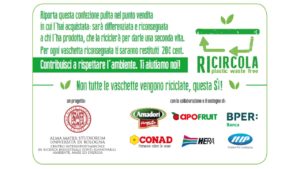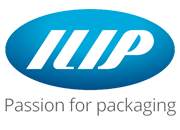“Ricircola” is launched, an innovative circular economy project for plastic food trays
The research project, designed and coordinated by the Alma Mater Studiorum – University of Bologna Interdepartmental Centre for Industrial Research in Renewable Resources, Environment, Sea and Energy (CIRI FRAME), experiments with plastic sustainability by directly involving each and every consumer, calling them to do their bit.
Amadori, Apofruit, BPER Banca, Conad, Ilip and Hera, together for the environment, collaborate and support the initiative.
Hinged on an idea of the Alma Mater Studiorum – University of Bologna Interdepartmental Centre for Industrial Research in Renewable Resources, Environment, Sea and Energy (CIRI FRAME), experimentation of the “Ricircola” project has been launched, a circular economy initiative that aims to improve management of plastic food trays at the end of their useful life, by integrating and holding accountable all chain players and, above all, by directly involving the consumer.
Until 15 November, three Conad points of sale in Romagna (La Filanda, Faenza, Case Finali, Cesena and Pinarella, Cervia) will be giving consumers the opportunity to choose two products with innovative packaging and play an active part in the first circular economy experiments applied to plastic food trays.
Specifically, by purchasing products marked by the RICIRCOLA symbol, Amadori chicken fillet (400 g) and Solarelli – Apofruit seedless white grapes (500 g), the customer is asked to promise to return the empty plastic tray, after finishing the product, to the collection points set up in the supermarkets involved. This commitment will be rewarded by a reimbursement of 20 euro cents per tray returned. The material collected, created by Ilip in PET, a plastic material with properties that make it perfect both for use in contact with food and for recycling, will then be delivered through a dedicated system organised by Hera to the manufacturer’s own recovery plant, thereby closing the cycle. The recycled plastic will then be used to produce other trays. The whole project, developed entirely in Emilia-Romagna, is also sponsored by BPER Banca, an institute that is sensitive to environmental matters, with an active role played by the Regional Directorate of Romagna and Marche.
The objectives include spreading awareness that after use, plastic, and in particular plastic packaging, should no longer be considered waste, but rather a resource to be recovered and from which to create other value. Aligning the plastic chain with the principles of the circular economy retains the advantages of using plastic packaging, drastically reducing the impact caused by poor management.
“The initiative aims to show that the problem is not plastic, but rather, as the project name suggests – Plastic Waste Free – the waste that needs to be reduced and managed” – Augusto Bianchini, Associate Professor of Alma Mater Studiorum – University of Bologna and scientific reference person for the project, says – “With the RICIRCOLA project, we seek to define a new way of managing plastic, potentially more sustainable in environmental, social and economic terms”. To verify the sustainability of this method, CIRI FRAME will be using its own scientific model that can quantify the environmental, social and economic impacts of the initiative.
Request more information >>>

